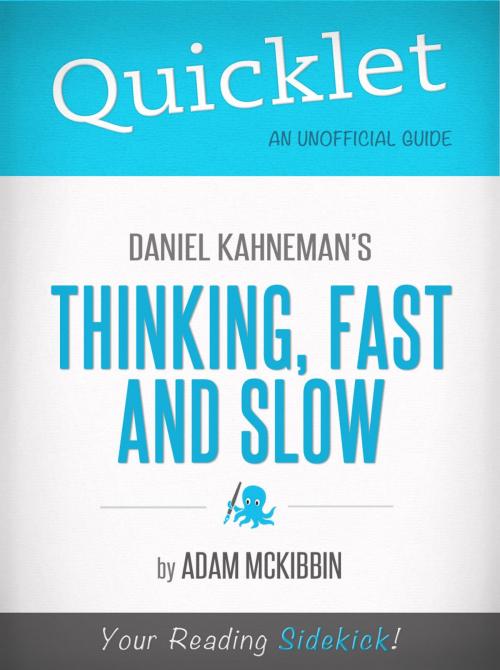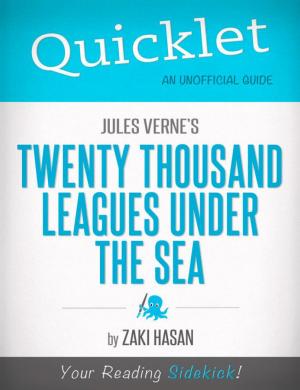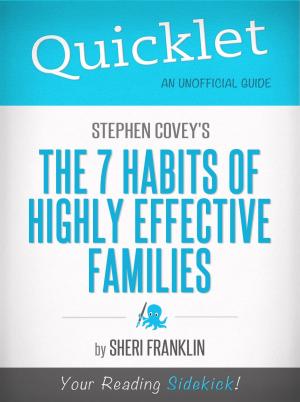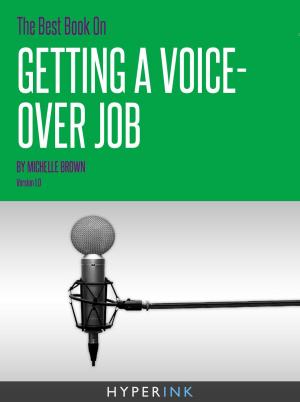Quicklet on Daniel Kahneman's Thinking, Fast and Slow (CliffsNotes-like Summary, Analysis, and Commentary)
Nonfiction, Health & Well Being, Psychology, Creative Ability, Reference & Language, Study Aids| Author: | Adam McKibbin | ISBN: | 9781614643364 |
| Publisher: | Hyperink | Publication: | March 2, 2012 |
| Imprint: | Language: | English |
| Author: | Adam McKibbin |
| ISBN: | 9781614643364 |
| Publisher: | Hyperink |
| Publication: | March 2, 2012 |
| Imprint: | |
| Language: | English |
Quicklets: Your Reading Sidekick!
This Hyperink Quicklet includes an overall summary, chapter commentary, key characters, literary themes, fun trivia, and recommended related readings.
ABOUT THE BOOK
While experts have roundly debunked the popular notion that we feeble humans only utilize 10 percent of our brains, most of us still find ourselves secretly believing (or wishing) that there is uncharted territory upstairs to explore. As we get older, our brains well, I dont want to speak for you, so Ill say my brain increasingly fills with useless detritus; I will thus forget to buy a necessary item at the store, but will be able to sing along lyric-for-lyric with some old Def Leppard song during the drive home. Self-help books that promise to unlock your secret brainpower will mostly peddle you the same old platitudes. Where to turn when you want to take a serious tour through your own thought process?
Daniel Kahnemans Thinking, Fast and Slow hit the bulls-eye for me. While not a self-help book by any traditional definition, Kahnemans work offers actionable insights about decision-making and gut reactions that did indeed help me to help myself. By breaking the brain into two separate and sometimes competing components (System 1 and System 2), the author helps the reader recognize some very common pratfalls.
MEET THE AUTHOR
Adam McKibbin's work has appeared in a wide variety of magazines and websites, including The Nation, the Chicago Tribune, AlterNet, Paste and Punk Planet. He studied creative writing at the University of Wisconsin and received the Award for Academic Excellence for his collected fiction. Adam lives in Los Angeles with his wife and daughter, and can be found on Twitter at @TheRedAlert.
EXCERPT FROM THE BOOK
In one example, the reader is asked to picture a passenger on the New York subway reading the Times, and to guess whether the person has a PhD or didnt go to college at all. The common gut reaction is to pick the PhD, even though there are far fewer PhDs on the subway at a given time than passengers without college degrees. Not just taking a situation at its face value, even statistically speaking, runs counter to how System 1 is programmed to operate.
Kahneman sprinkles some academic autobiography through the book as well. Part 2 includes a section on what he calls the best-known and most controversial of his experiments with Amos Tversky: a seemingly simple question about a young woman named Linda. Linda is introduced to the crowd as a young woman who majored in philosophy and kept active with various social causes. Kahnemans audience then had to choose the most likely outcome for Linda. Was she a bank teller or a bank teller who was active in the feminist movement? Although the former is the smarter choice, an overwhelming number of undergraduates chose the latter due to the associations they were making about Linda. Even renowned scientist Stephen Jay Gould fell into the trap...
Buy a copy to keep reading!
Quicklets: Your Reading Sidekick!
This Hyperink Quicklet includes an overall summary, chapter commentary, key characters, literary themes, fun trivia, and recommended related readings.
ABOUT THE BOOK
While experts have roundly debunked the popular notion that we feeble humans only utilize 10 percent of our brains, most of us still find ourselves secretly believing (or wishing) that there is uncharted territory upstairs to explore. As we get older, our brains well, I dont want to speak for you, so Ill say my brain increasingly fills with useless detritus; I will thus forget to buy a necessary item at the store, but will be able to sing along lyric-for-lyric with some old Def Leppard song during the drive home. Self-help books that promise to unlock your secret brainpower will mostly peddle you the same old platitudes. Where to turn when you want to take a serious tour through your own thought process?
Daniel Kahnemans Thinking, Fast and Slow hit the bulls-eye for me. While not a self-help book by any traditional definition, Kahnemans work offers actionable insights about decision-making and gut reactions that did indeed help me to help myself. By breaking the brain into two separate and sometimes competing components (System 1 and System 2), the author helps the reader recognize some very common pratfalls.
MEET THE AUTHOR
Adam McKibbin's work has appeared in a wide variety of magazines and websites, including The Nation, the Chicago Tribune, AlterNet, Paste and Punk Planet. He studied creative writing at the University of Wisconsin and received the Award for Academic Excellence for his collected fiction. Adam lives in Los Angeles with his wife and daughter, and can be found on Twitter at @TheRedAlert.
EXCERPT FROM THE BOOK
In one example, the reader is asked to picture a passenger on the New York subway reading the Times, and to guess whether the person has a PhD or didnt go to college at all. The common gut reaction is to pick the PhD, even though there are far fewer PhDs on the subway at a given time than passengers without college degrees. Not just taking a situation at its face value, even statistically speaking, runs counter to how System 1 is programmed to operate.
Kahneman sprinkles some academic autobiography through the book as well. Part 2 includes a section on what he calls the best-known and most controversial of his experiments with Amos Tversky: a seemingly simple question about a young woman named Linda. Linda is introduced to the crowd as a young woman who majored in philosophy and kept active with various social causes. Kahnemans audience then had to choose the most likely outcome for Linda. Was she a bank teller or a bank teller who was active in the feminist movement? Although the former is the smarter choice, an overwhelming number of undergraduates chose the latter due to the associations they were making about Linda. Even renowned scientist Stephen Jay Gould fell into the trap...
Buy a copy to keep reading!















